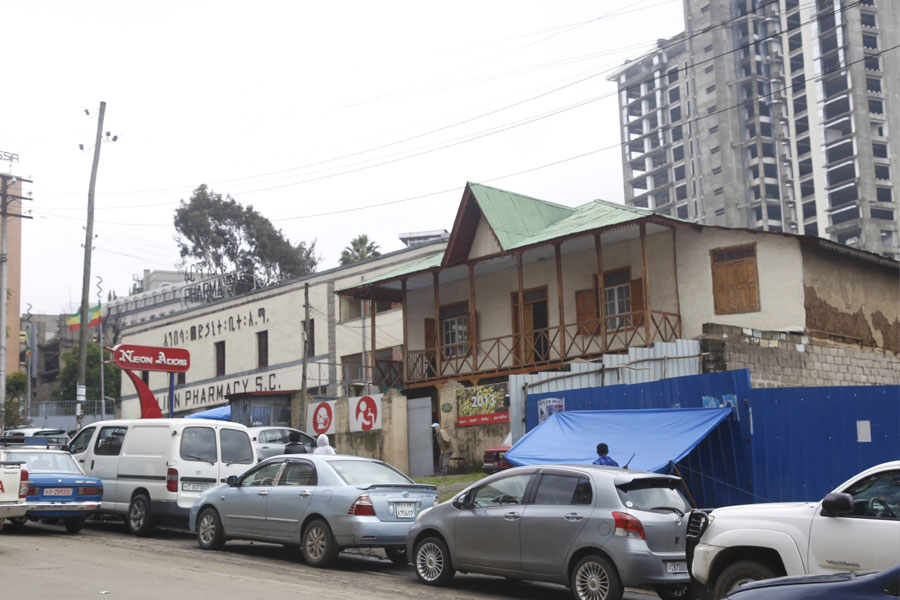
On the evening of the first Wednesday of this month, the DJ of Metro Club, the luxurious semi-open roof lounge, was playing different genres of music until the band took over the stage at 9:00pm.
Metro is a club found at Hyatt Regency Hotel located at Meskel Square. The club has a live entertainment programme every day of the week.
The young musician Elias Teklehaimanot, who won third-place on Fana Television’s Lamrot music contest a week ago, was part of the band and sat on one of the chairs waiting for the other band members to join him.
Elias, who started working at Metro two months ago, has worked at multiple clubs. He was not too happy about working in previous clubs because of the tobacco issue.
"I used to suffer from my sinuses in the morning, because of the cigarette smoke I inhaled while performing live the night before,” he told Fortune.
He would hold his breath for a moment so as not to inhale the cigarette smoke whenever anyone smoking would pass by him.
At Metro, no one smokes cigarettes in the club. Anyone who wants to smoke is supposed to go outside to an area that is designated for smoking.
The bulk of research shows that non-smokers in the vicinity of cigarette smoke are found to be associated with an increased risk of lung cancer.
There is no safe level of exposure to second-hand smoke, according to a report from the Global Adult Tobacco Survey (GATS) released in 2016.
Metro and other clubs, hotels and hospitality service providers banned indoor smoking following a letter issued by the Ministry of Health.
The letter followed with a consent agreement that was signed between the Food & Drug Authority (FDA) and the hotels, bars and clubs to outlaw indoor smoking.
The agreement from the Authority also follows a proclamation that was legislated in February 2019 after going through a drafting process for three years by the FDA and the Ministry.
Dubbed the Food & Medicine Administration Proclamation, the law sets a new regulatory framework for food, medicine, medical devices, cosmetics, alcoholic beverages and tobacco products.
A "No Smoking" sign sits on a table in a Hotel lobby here in Addis Abeba.
The proclamation also puts various restrictions and limitations on the advertisement, sale and use of alcoholic and tobacco products. The regulations span from the production and importation to the distribution and promotion of these products.
Sub-article one of Article 48 of the proclamation states that no person may smoke or use tobacco products in any part of indoor workplaces, public places, on all means of public transport, and in all common areas within condominium housings. No one may smoke or use tobacco outdoors within ten metres of any doorway, operable window or air intake mechanism of any public place or workplace, according to the law.
Before the legislation of the bill, the Authority discussed the draft proclamation with 175 star-hotel owners and general managers.
Though the law was legislated last February, no government office or institution was enforcing the ban on indoor smoking. However, about a month ago, all the hotels were told to outlaw indoor smoking.
If these facilities are found allowing people to smoke indoors, the owners of the enterprises will be imprisoned for a time not exceeding three months or fined an amount not exceeding 10,000 Br, according to the agreement signed between the Authority and the facilities. Additionally, if these facilities do not post a No Smoking sign with a proper colour, the owners will be imprisoned for a time not exceeding three months or will receive a fine not exceeding 1,000 Br.
This frustrated hotels, bars and clubs in the city, who fear their business could suffer since the law may exclude customers.
The previous law used to allow these facilities to designate a smoking area, but the new one forces smokers to move far away from the business.
“It’s discouraging tourists from coming to Ethiopia,” said Lude Abiy, general manager of Addis Abeba Hotel Owner’s Sectoral Association, which has 120 members.
Tourism is one of the nation’s biggest earners of foreign currency. In 2018 the country generated 435.3 million dollars from 933,000 tourists who visited Ethiopia.
Many of these hotels are located in Kazanchis and Bole areas on the main roadsides, according to Lude.
"It'll expose customers to theft and other hazardous situations when they walk the ten-metre distance from the hotels to smoke,” she said.
The concern is shared by the management of Radisson Blu Hotel.
Mesfin Abdi, director of human resources and training at Radisson Blu Hotel, one of the international brand hotels in the capital, says that the law does not consider what types of customers come to Ethiopia.
In February of this year the government banned indoor smoking, and a new proclamation forces smokers to stand more than 10 metres from any public building's doorway.
"For example, most Asians are smokers and they travel in groups," he said. "If a group of tourists want to book accommodations in our hotel, and we tell them that no smoking is allowed in the hotel, they may change their mind about coming to Ethiopia, as at least one person in the group is a smoker.”
Hotels say they have already started losing business due to the new law.
"We've forced two guests to checkout for refusing to respect the rule of not smoking inside the hotel rooms,” said Esayas Gidey, director of operations and finance at Jupiter Hotel, which is located in Kazanchis on Marshal Tito Street. The hotel sits close to the road, which makes it difficult for guests to smoke far from the building.
Sileshi Girma, CEO of Tourism Ethiopia, does not agree with the claims that the law is affecting the tourism industry.
Travelers to Ethiopia come to learn the history, experience the landscape, as well as the cultural and religious places, according to him.
“When you go to the zoo, you are required not to disturb the animals, and when you go to religious places, you are supposed to respect the dogma of that religion,” he said. "We don’t appreciate cigarettes disturbing non-smokers."
The Authority argues that the new law came into effect only with the intention of discouraging smoking.
"What we want is to discourage smoking,” said Asnakech Alemu of the product safety directorate at the Authority.
Currently, there are over 3.2 million tobacco users in Ethiopia, and over one-third of the adult population are passive smokers. Second-hand smoke exposure is very high in bars and nightclubs followed by restaurants and universities.
In Ethiopia, over 1,000 people die because of tobacco-caused illnesses annually, according to GATS.
In the country, about 60.4pc of people are exposed to second-hand smoke in bars or night clubs, 31.1pc in restaurants, 29.3pc at the workplace, 12.6pc at home, and 11.4pc on public transportation, according to GATS.
Yohannes Paulos, CEO and owner of International Hotels & Property with 45 years of experience in 31 international hotels, also does not see the impact of the proclamation on tourism.
He says that many hotels in the United States and Europe ban indoor smoking, and they are still in the market.
"Smoking in airports was banned worldwide years ago, but no one refused to travel because smoking is not allowed," said Yohannes.
However, hotel owners, particularly those whose premises lie along main roads, which do not have land ten metres from their premises for their smoking customers, ask for the reconsideration of the proclamation to allow designated areas for smoking.
The Authority also says that the under draft regulation could address some of the concerns of the hotel owners.
“The regulation will consider some issues raised by hotel owners,” Asnakech told Fortune.
The new law frustrates not only the hotel owners but also the lone tobacco manufacturer, National Tobacco Enterprise Ethiopia (NTE). Several years ago Japan Tobacco International (JTI)acquired 71pc of the tobacco monopoly, NTE, by investing close to one billion dollars.
First established in 1942 as the Imperial Ethiopian Tobacco Monopoly, the Enterprise produces Nyala, Nyala Premium, Delight, Winston and Elleni, filtered cigarette brands. The non-filtered brand of the company is called Gissilla.
"It'll be benefiting those who import contraband cigarettes,” Yayehyirad Abate, corporate affairs & communications director the Enterprise, told Fortune.
By the new law, manufacturers are required to display health hazard warning messages that must cover 70pc of the cigarette packs.
“Cigarettes imported by the contraband market do not fulfill this requirement,” he said, "thus, consumers will go for the products that don't have hazardous warnings on the packs."
If the government wants to meet its objective, first it has to control the contraband, according to Yayehyirad.
Elias, one of those happy with the ban on indoor smoking, says that the law can be at least relaxed in allowing designated areas inside the premises of these service providers.
"We shouldn't forget the right of the smokers when we fight for the health of the non-smokers," Elias says.
PUBLISHED ON
Oct 05,2019 [ VOL
20 , NO
1014]

Fortune News | Jun 04,2022

Radar | Oct 05,2019

Fortune News | Jan 29,2022

Commentaries | Oct 26,2024


Dec 22 , 2024 . By TIZITA SHEWAFERAW
Charged with transforming colossal state-owned enterprises into modern and competitiv...

Aug 18 , 2024 . By AKSAH ITALO
Although predictable Yonas Zerihun's job in the ride-hailing service is not immune to...

Jul 28 , 2024 . By TIZITA SHEWAFERAW
Unhabitual, perhaps too many, Samuel Gebreyohannes, 38, used to occasionally enjoy a couple of beers at breakfast. However, he recently swit...

Jul 13 , 2024 . By AKSAH ITALO
Investors who rely on tractors, trucks, and field vehicles for commuting, transporting commodities, and f...

Oct 18 , 2025
The political establishment, notably the ruling party and its top brass, has become p...

Oct 11 , 2025
Ladislas Farago, a roving Associated Press (AP) correspondent, arrived in Ethiopia in...

Oct 4 , 2025
Eyob Tekalegn (PhD) had been in the Governor's chair for only weeks when, on Septembe...

Sep 27 , 2025
Four years into an experiment with “shock therapy” in education, the national moo...